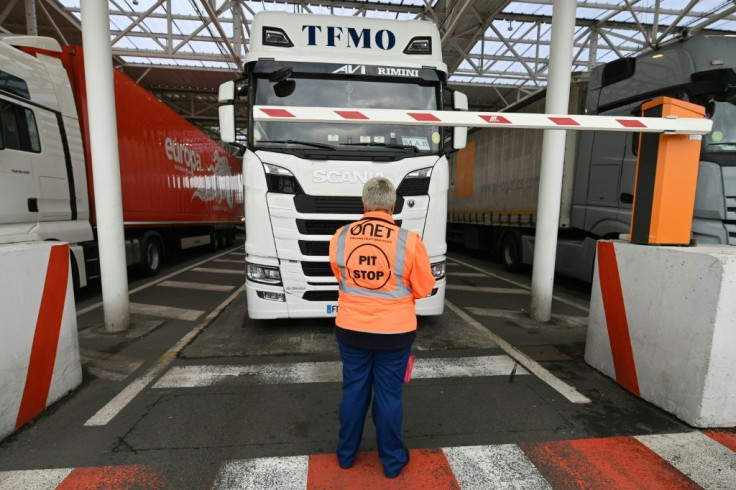Cross-Channel Trade Put To No-deal Brexit Test In Calais

A handful of truck drivers in the French port of Calais got a taste Tuesday of what awaits if Britain crashes out of the EU without a deal, as authorities there simulated the return of customs checks.
Didier Verhaeghe, a trucker with 35 years experience, was one of a handful of drivers whose vehicle was searched on his arrival in Europe's busiest port for cross-Channel traffic.
"This is my Brexit today," the 52-year-old driver told reporters wearily as officials in Calais's new Brexit customs hangar counted the bags of cement he was transporting from London.
"I'm not going to England anymore," he vowed, saying he feared being stuck in Dover for days, even weeks, in the event of a no-deal Brexit on October 31.
A total of around 20 hauliers were inspected on Tuesday after arriving by ferry from Britain on Tuesday.
The exercise was the third in as many weeks on France's northern coast, a major hub for trade between Britain and its EU neighbours, with French authorities insisting they are ready.
It covered only a fraction of the 5,000-6,000 trucks travelling between France and Britain each day -- flows that could quickly become clogged if exporters do not have their documents in order.
It came as a British court ruled that Prime Minister Boris Johnson unlawfully suspended parliament -- a major blow to the premier who has staked his reputation on taking Britain out of the EU.
As analysts pondered whether the ruling would lead to another postponement of Britain's departure from the bloc, France was trialling its new "smart border" systems designed to prevent huge traffic jams in the event of a messy divorce.
Ten trucks bound for Britain and 10 departing Dover for Calais were asked for shipping documents containing a new barcode, which was scanned and forwarded along with the truck's registration number to customs officials on the other side of the Channel.
'I think we're ready'
France has spent some 40 million euros ($44 million) and hired 600 extra customs officers to prepare for the prospect of an abrupt end to free trade with Britain.
"I think we're ready," Jean-Michel Thillier, deputy director of the French customs service, told AFP on Tuesday.
"As far as customs are concerned, we have done everything we should," he said, adding there was "little chance" of major delays on the French side.
But many companies that do business with Britain fear a Brexit body blow.
Marie Rivenez, head of GRG, one of France's biggest meat wholesalers, which imports 600 lambs each day from Britain, told AFP she had received "absolutely no information" about what kind of sanitary checks, if any, might apply after Brexit.
"We're not very prepared," she said.
Tereos, the world's third-biggest sugar producer which supplies United Biscuits, makers of McVitie's biscuits, among other British companies, said it was bracing for import tariffs of nearly 40 percent on some of its products.
Paul Jacquelin, Tereos' business transformation manager said he was also worried that the company's syrups, which have a short shelf live, could solidify if held up in Calais.
"We're asking for Britain to remain in the customs union, or for a free-trade deal," he said.
The deputy head of the operator of Calais port, Benoit Rochet, compared the change for companies that do business with Britain to the situation of Europeans travelling to the United States, who have to apply for a visa or visa waiver ahead of travel.
"When you travel to the US you don't arrive at the airport with your hands empty."
Around 100,000 French companies trade with Britain, which is the sixth-biggest destination for French exports.
© Copyright AFP 2024. All rights reserved.





















